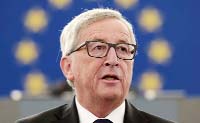
AFP, Brussels :
The race to succeed Jean-Claude Juncker as head of the first post-Brexit European Commission begins later this month-and in typical EU style it is starting with a row about how the race should be run.
While the EU’s French Brexit negotiator Michel Barnier is the rumoured early front runner to take charge of the bloc’s executive arm in 2019, the process itself has not even got off the ground.
At stake is not just a power struggle between national leaders and the European Parliament over who chooses Juncker’s successor, but questions about democracy that could give fresh ammunition to eurosceptics opposed to the EU.
Juncker was picked in 2014 by a new and controversial “Spitzenkandidat” system-German for “lead candidate”-under which the biggest political group in the European Parliament gets to nominate its candidate for the job. The European Council of 28 national leaders then makes the final choice, “taking account” of the parliament’s nomination, in the vaguely worded provision of its the EU’s treaties. The whole parliament gets a vote at the end.
But many of those national leaders, who will discuss the issue at a Brussels summit on February 23, oppose what they view as a stitch-up by MEPs that robs countries of their power to pick who will fill one of the continent’s most influential roles.
‘Frustration In Capitals’
Juncker has said that he will not seek a second term in the job when his term expires next year.
European Council President Donald Tusk is expected to lay out options at the leaders’ summit, including whether to continue with the Spitzenkandidat system again next year or reject it.
“In 2014 there was some frustration in a number of capitals that the process which led to the nomination of Juncker was not transparent enough,” a European source said on condition of anonymity.
Foremost among its opponents now is Emmanuel Macron, the youthful new French president spearheading efforts to reform the bloc after Britain’s vote to leave.
Critics say the system has politicised the European Commission, an issue which plays into concerns about national sovereignty versus Brussels, and possibly created the conditions for Brexit itself.
The race to succeed Jean-Claude Juncker as head of the first post-Brexit European Commission begins later this month-and in typical EU style it is starting with a row about how the race should be run.
While the EU’s French Brexit negotiator Michel Barnier is the rumoured early front runner to take charge of the bloc’s executive arm in 2019, the process itself has not even got off the ground.
At stake is not just a power struggle between national leaders and the European Parliament over who chooses Juncker’s successor, but questions about democracy that could give fresh ammunition to eurosceptics opposed to the EU.
Juncker was picked in 2014 by a new and controversial “Spitzenkandidat” system-German for “lead candidate”-under which the biggest political group in the European Parliament gets to nominate its candidate for the job. The European Council of 28 national leaders then makes the final choice, “taking account” of the parliament’s nomination, in the vaguely worded provision of its the EU’s treaties. The whole parliament gets a vote at the end.
But many of those national leaders, who will discuss the issue at a Brussels summit on February 23, oppose what they view as a stitch-up by MEPs that robs countries of their power to pick who will fill one of the continent’s most influential roles.
‘Frustration In Capitals’
Juncker has said that he will not seek a second term in the job when his term expires next year.
European Council President Donald Tusk is expected to lay out options at the leaders’ summit, including whether to continue with the Spitzenkandidat system again next year or reject it.
“In 2014 there was some frustration in a number of capitals that the process which led to the nomination of Juncker was not transparent enough,” a European source said on condition of anonymity.
Foremost among its opponents now is Emmanuel Macron, the youthful new French president spearheading efforts to reform the bloc after Britain’s vote to leave.
Critics say the system has politicised the European Commission, an issue which plays into concerns about national sovereignty versus Brussels, and possibly created the conditions for Brexit itself.

